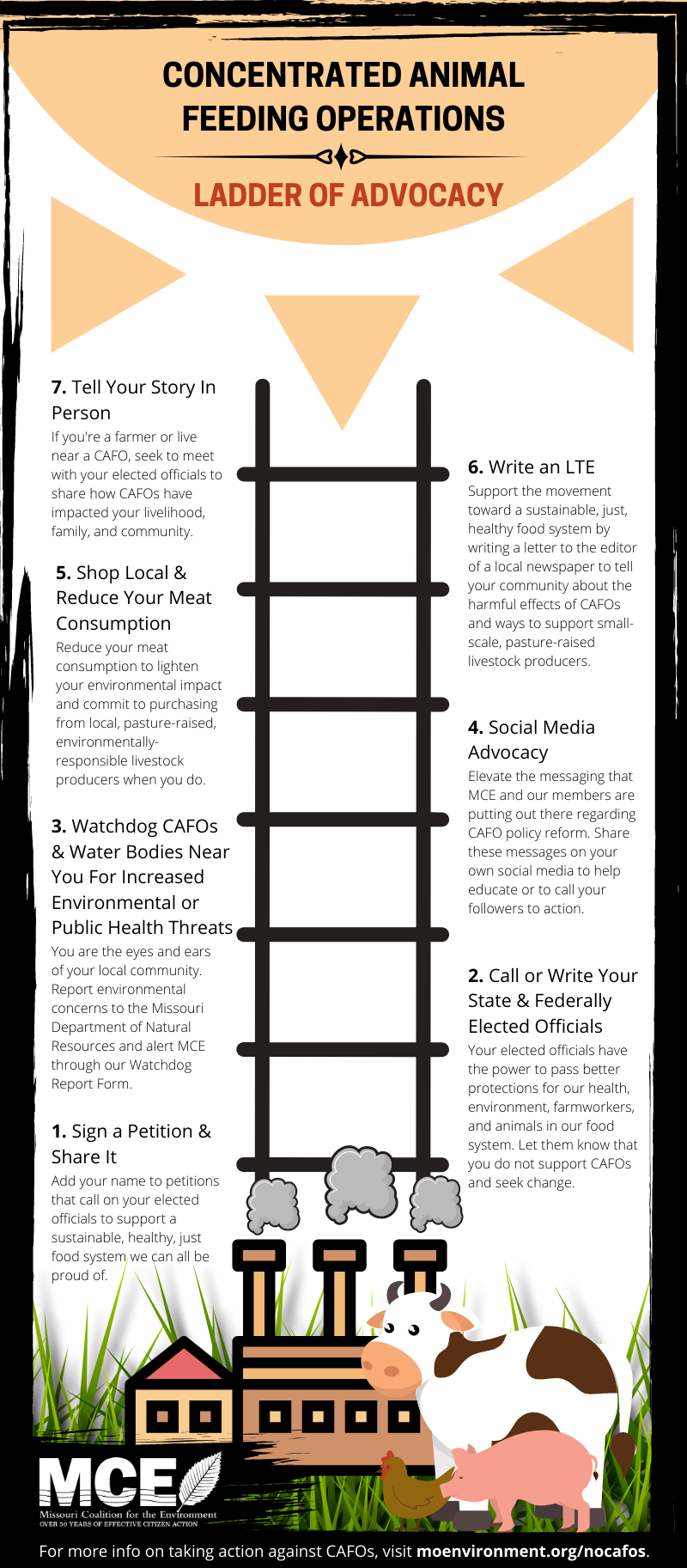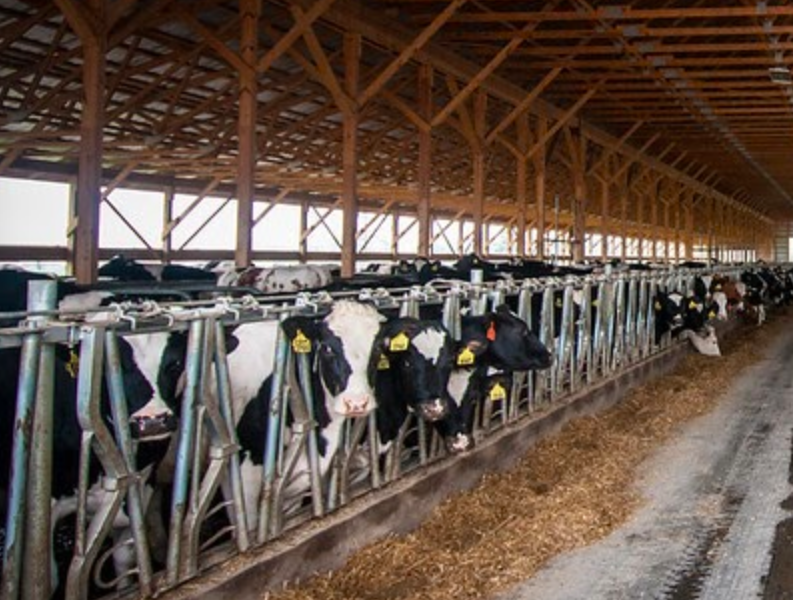Most animal production in the United States comes from concentrated animal feeding operations (CAFOs), also referred to as factory farms. Confining hundreds to hundreds of thousands of animals together, often pumped with multiple antibiotics at every meal, poses a significant number of environmental and human health threats that are well documented, such as antibiotic resistance, ease of disease outbreak, and contamination of air and water in the surrounding communities. Follow the ladder of advocacy below for different levels that you can take action to say no to CAFOs and join MCE’s CAFO Action Network to receive updates and action items regarding Missouri CAFO activities. You can also support legal action to protect human health and the environment from the threats of CAFOs by making a donation.
CAFOs Ladder of Advocacy
Take Action:
7. Tell Your Story In Person
If you’re a farmer, live near a CAFO, or work at a CAFO, seek to meet with your elected officials to share specifically how CAFOs have impacted your livelihood, your family, and your community.
Contact Senator Hawley, here.
Contact Senator Blunt, here.
Not in Missouri? Find your Senators’ contact information, here.
6. Write an LTE
In order to support the movement toward a sustainable, just, healthy food system, you can help spread the word in your community about the harmful effects of CAFOs and ways to support small-scale, pasture-raised livestock producers by writing about it to your local newspaper. Contact MCE at mvatterott@moenviron.org about how to write and submit a powerful LTE!
See a sample LTE here.
5. Shop Local & Reduce Your Meat Consumption
Reduce your meat, eggs, and dairy consumption to lighten your impact on the environment but commit to purchasing from local, pasture-raised, environmentally-responsible livestock producers when you do. These purchasing decisions signal you’re saying NO to CAFOs and supporting a food system we can all be proud of.
Shop with and support Known & Grown St. Louis farmers. Known and Grown focuses on supporting a thriving, local, equitable, food system within 150 miles of St. Louis, which we refer to as the “St. Louis Foodshed.”
4. Social Media Advocacy
Help amplify the messaging that MCE and our members are putting out there regarding CAFO policy reform – please share these messages on your own social media, whether simply to help with education or to call your followers to action. You can also use social media, particularly Twitter, to get the attention of decision makers by tagging them in your posts about CAFO concerns.
Social media toolkits centered around the issue of CAFOs:
Advocate for better policy
Advocate for local food and against factory farms
Advocate for greater enforcement of regulations on CAFOs to protect our health
Advocate the need for mindful consumption practices
Advocate the importance of taking action against CAFOs and how to do so
3. Watchdog CAFOs & Water Bodies Near You For Increased Environmental or Public Health Threats
You are the eyes and ears of your local community. Keep an eye out for signs of CAFO waste getting into water bodies such as fish kills, algal blooms, discolored (brown or reddish) water, and/or foul-smelling water. Keep an eye out for manure application during and directly after rainfall as a sign of manure runoff risk. Also keep an eye out for carcasses being disposed of in wastewater lagoons, fields, waterways, and roadways, as well as increased noises or smells from animals – these may signal that CAFOs are holding more animals than they are permitted for. Use MCE’s CAFO Toolkit to learn more about documenting and reporting these concerns to regulators and taking action against CAFO expansion. You can also alert MCE when you see these things through our Watchdog Report Form.
2. Call or Write Your State & Federally Elected Officials
Your elected officials have the power to pass better protections for our health, environment, farmworkers, and animals in our food system. Calling them is the best way to get your message that you do not support CAFOs and want them to seek change. Do not be intimidated by calling, it is the job of their staff to take your call and note your concerns. The more often you call, the better!
Contact Senator Hawley, here.
Contact Senator Blunt, here.
Not in Missouri? Find your Senators’ contact information, here.
1. Sign a Petition & Share It
Your elected officials have the power to pass better protections for our health, environment, farmworkers, and animals in our food system. Add your name to petitions calling on them to support a sustainable, healthy, just food system we can all be proud of. Then share the petition with your friends and family!
Petition(s) to sign:
-Foodchain Workers Alliance petition to tell Congress to pass the emergency health and safety protections for workers immediately
-Demand stronger workplace health and safety protections for frontline food workers
-Protect Florida farmworkers during the COVID-19 crisis


